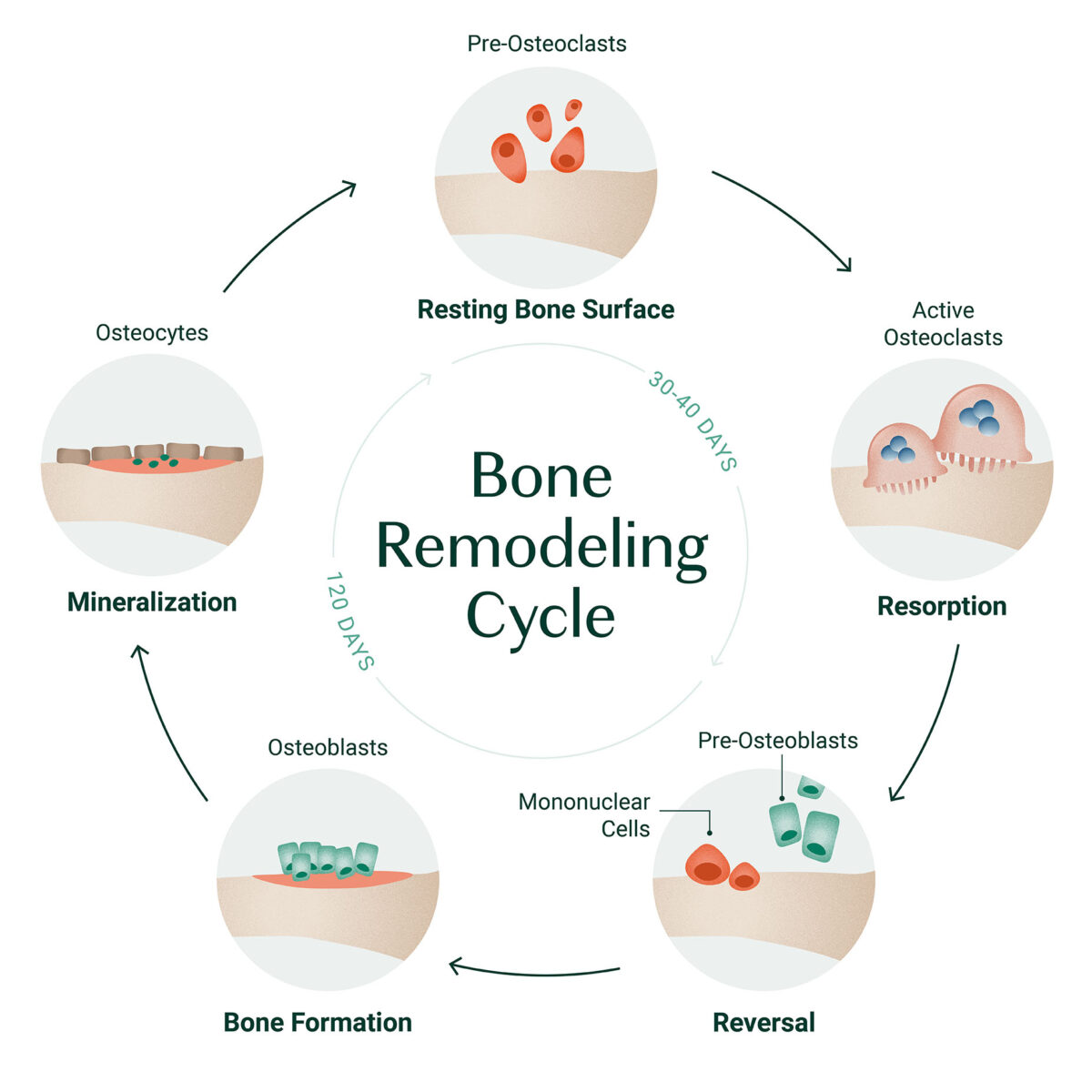Could that sweet tooth of yours be the reason your bone density isn’t improving?
Blood sugar directly impacts bone health, and while conditions like diabetes may not directly cause osteoporosis, they can certainly increase your risk.
But knowledge is power, so let’s dive in and discuss exactly how your blood sugar can make or break bone health – and which preventative steps you can take to keep your bones and metabolic health in tip-top shape.
Blood Sugar and Bone Health: What’s The Connection?
If the story of your bone health was a Broadway show, you could think of your blood sugar as the primary antagonist. While nutrients like calcium, vitamin D, and vitamin K took center stage as the heroes – blood sugar would be lurking in the background, waiting for its chance to cause havoc.
And this sneaky antagonist isn’t a one trick pony either – it has several tactics to lean on to cause misery for your bones.
First, when your blood sugar is high, it directly impacts the function of your bone cells, namely your osteoblasts and osteoclasts.
Osteoblasts are your bone-building cells responsible for keeping your bones mineralized, dense, and healthy. Osteoclasts, on the other hand, are your bone cells that are responsible for resorption (breakdown). Under healthy circumstances, osteoclasts help to remove old bone to make way for new bone laid down by osteoblasts.
Together, these two cells carry out bone remodeling, which allows your bones to remain strong and healthy. That is, of course, so long as their activity is balanced.

With high blood sugar, the activity of osteoblasts is inhibited, which means that bone-building is put on hold. Simultaneously, osteoclast cell activity is also blunted, impairing bone resorption [1][2].
The result? Weak and brittle bones.
And if that wasn’t bad enough, if your blood sugar remains high for an extended time, it can eventually stimulate the production of macrophage colony-stimulating factor (MCSF). Why does this matter? MCSF ramps up osteoclast activity, putting bone breakdown into overdrive as bone building remains on hold [3].
And then, of course, there’s the matter of AGES.
AGES (advanced glycation end products) are protein or lipid molecules that have a sugar attached to them (via a process called glycation). Glycation happens when there is excessive glucose in your bloodstream, a common side effect of hyperglycemia.
The presence of AGES in your bone tissue incites oxidative stress, and further impairs your bones remodeling process. AGES may also alter bone structure and architecture, leaving your bones vulnerable to fracture [4][5][6].
The Osteocalcin Connection
In addition to the detrimental impact that high levels of sugar in your blood can have on your bone health, there is another key actor at play that must be mentioned – osteocalcin.
Now, you may be familiar with osteocalcin as the hormone that regulates bone mineralization, but studies show that this hormone does much more than help to shuttle minerals around – osteocalcin appears to have a direct hand in blood sugar regulation [7].
In fact, research shows that people with type 2 diabetes tend to have low osteocalcin levels, and when those with type 2 diabetes have higher levels of this hormone, it positively impacts their blood glucose control [8][9].
How exactly does osteocalcin impact blood sugar? Studies suggest that this hormone influences beta cell function, which are the cells responsible for insulin production and release. Thus, osteocalcin may directly increase insulin secretion and sensitivity [10].
Now, here’s the good news: the same nutrients you need to promote healthy bones will also promote the production of osteocalcin. Namely, vitamin D and vitamin K. Therefore, by caring for your bones, you’ll be both directly and indirectly caring for your blood sugar and metabolic health [11][12].
Bone Health and Blood Sugar: What Can You Do
Your diet is the number one factor to consider when managing blood sugar. Limiting highly processed forms of carbohydrates is essential, and including high-quality fats and protein sources will help to keep your blood sugar levels on an even keel throughout the day.

Of course, if you already have a metabolic condition, you may need to take more care and keep an eye on your nutrient intake, depending on how your body responds to macronutrients. But that would be a subject you should cover with your healthcare practitioner.
In addition to diet, several nutrients impact both bone and metabolism.
As you just learned, vitamins K and D are crucial for synthesizing osteocalcin, which helps keep your bones strong and mineralized and directly impacts blood sugar control. And magnesium, a vital mineral for bone health, also assists with insulin activity, helping to keep your blood sugar within a healthy range [13].
Finally, physical activity can directly impact bone health and metabolic maintenance. Weight-bearing activity influences bone density by improving muscle mass, which not only keeps you moving, but helps to keep your bones strong while you do it [14].
At the same time, physical exercise can promote insulin sensitivity by priming your cells for glucose absorption while assisting with weight management [15].
Takeaway
There’s nothing wrong with a little treat here or there, but if your goal is to keep your bones healthy and strong, you can’t overlook the impact of blood sugar.
And while the systems in your body are incredibly complex, what we find over and over is that nourishing one aspect of your physiology often has a positive impact on the whole. This is certainly the case when it comes to bone health and metabolic health.
For more news and insights related to all things bone health and healthy aging, sign up for the AlgaeCal Newsletter.
FAQs
What effect does diabetes have on bone density?
Diabetes may impair bone density due to the impact of high blood sugar on bone health. Specifically via the production of AGES, the inhibition of osteoblast activity, and the impact on osteoclast activity.
What should people with diabetes and osteoporosis eat?
People with diabetes who also have osteoporosis should focus on foods that contain bone-building nutrients such as calcium, vitamin D, magnesium, and vitamin K. Many of these nutrients will also assist with blood sugar regulation.
Does blood sugar affect bones?
High blood sugar can degrade bones by inhibiting bone formation and increasing the breakdown of healthy bone.





Deidre Hankins
November 8, 2023 , 10:31 amI am at a loss. I do not eat sugar or use salt. When I went to get the results of my bloodwork my A1C, sodium, and potassium were all high plus my kidney function scores were out of whack. I am truly confused as to what I should do. When I look up low potassium, low sodium, low carb diets, they all have more of that than what I already eat.
I can’t afford to lose weight because I am already 95 pounds and trying to cut back on the few carbs I have been eating, now I am losing weight.
Any suggestions?